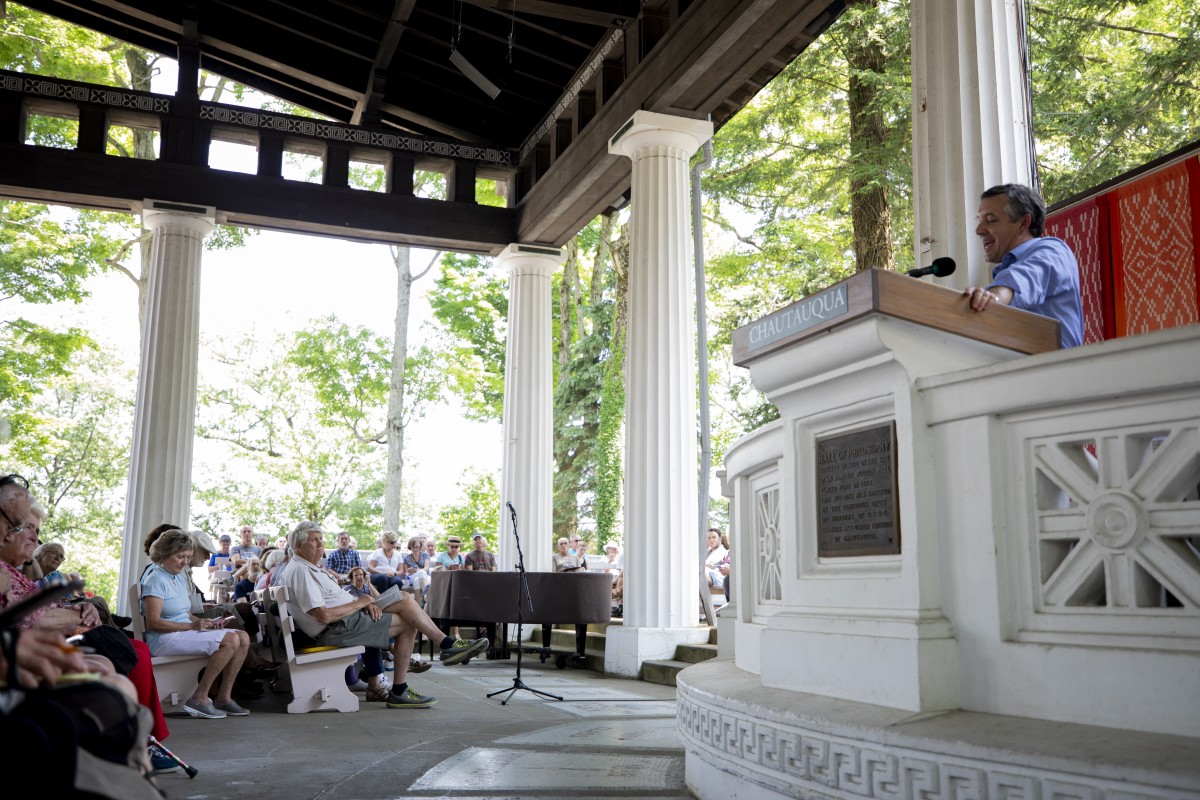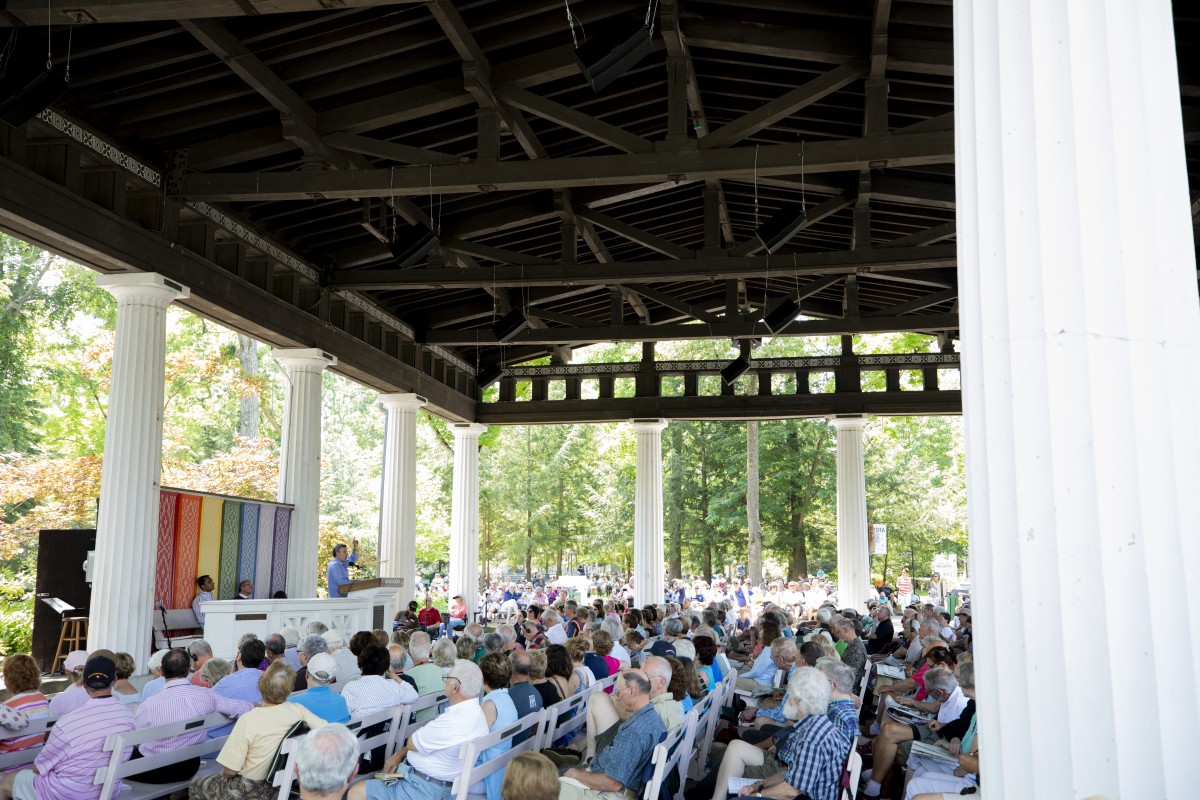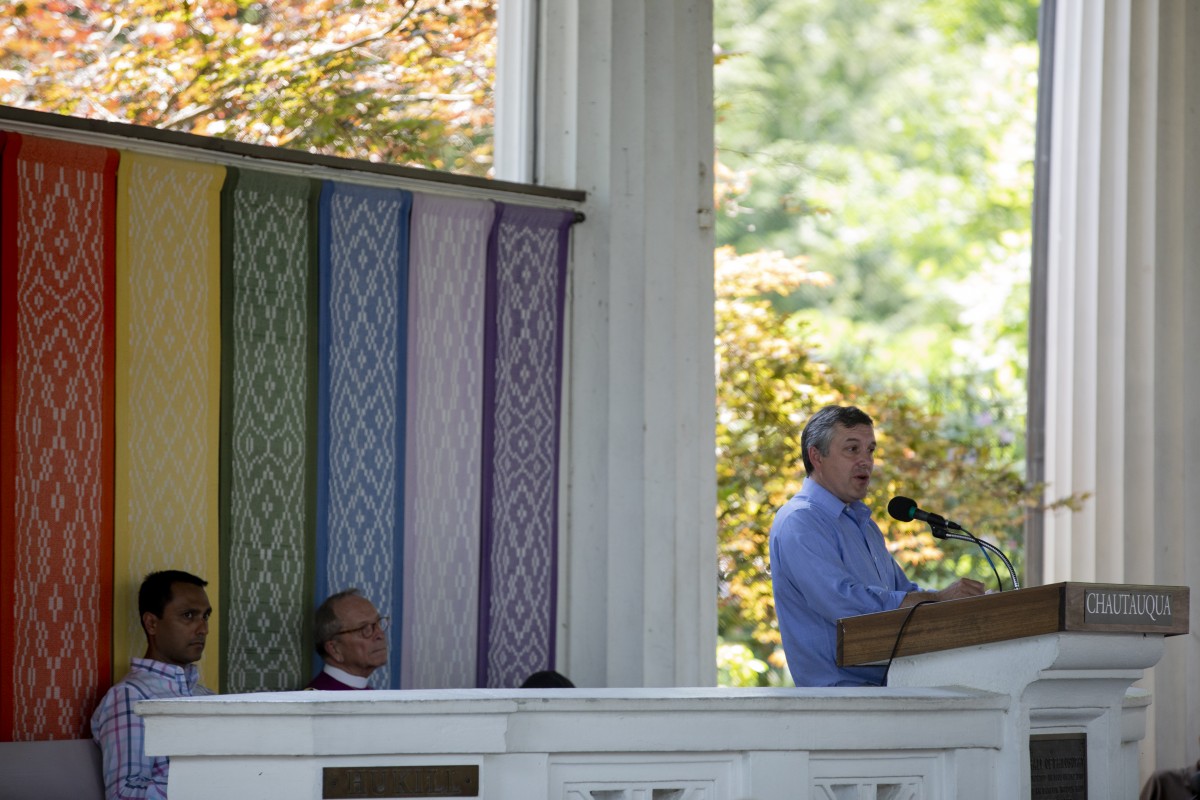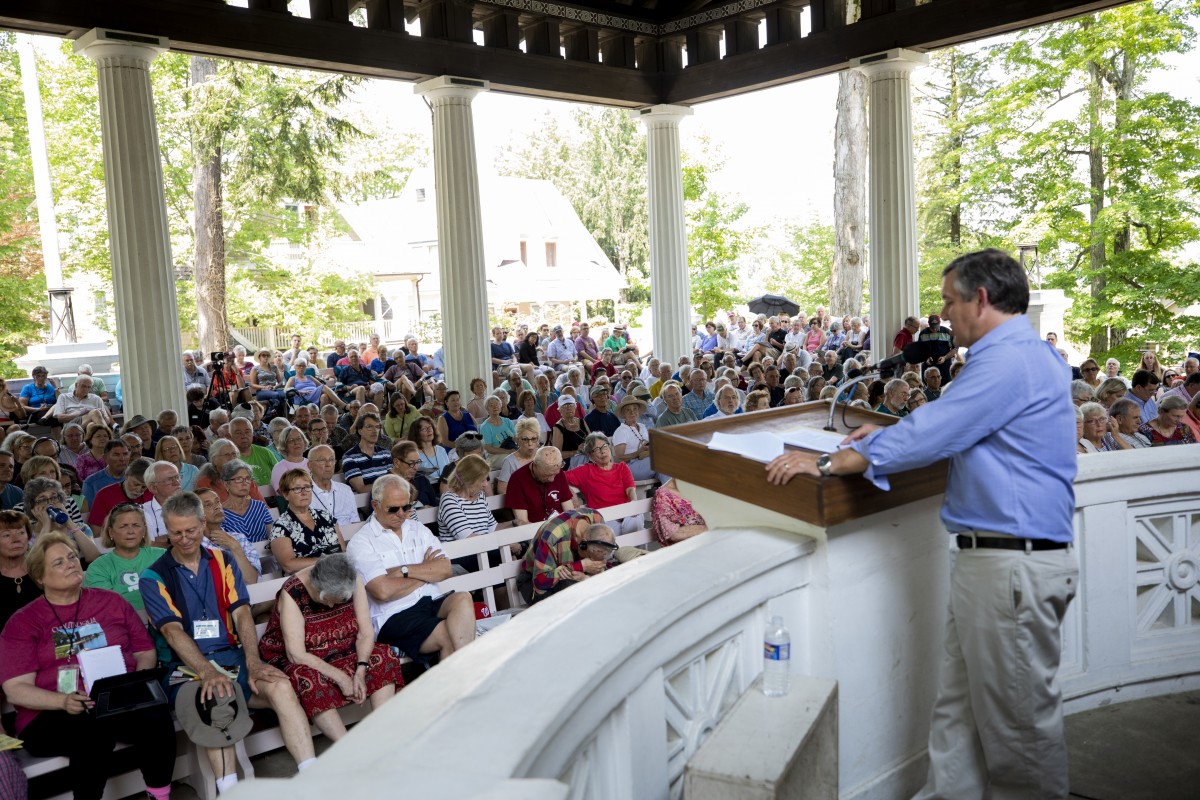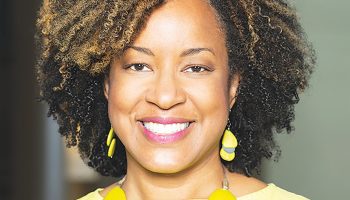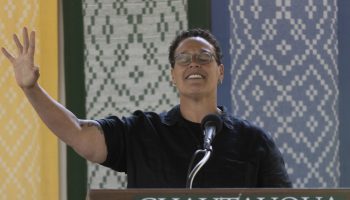The United States is comprised of several different regions, each with its own cultural identity and rich history. Exactly where those regions start and end has been a long-running debate, but according to Colin Woodard, it is simple: the United States can be divided into 11 distinct sub-nations.
At 2 p.m. on Tuesday, July 3, in the Hall of Philosophy, Woodard — award-winning author and journalist — gave his lecture, “American Character: The Struggle between Individual Liberty and the Common Good and the Survival of the Republic,” as part of Week Two’s interfaith theme, “Religion and American Identity.” Woodard’s lecture was moderated by Interfaith Youth Core Founder Eboo Patel. Patel, who is moderating all of the Week Two interfaith lectures, is an advocate for religious tolerance and wrote a set of essays on religious pluralism that will be published in the fall by Princeton University Press.
“You can’t understand American history, American identity, or indeed our current political cleavages, which are geographic even as they are ideological, without knowing that there has never been one America but rather several Americas,” Woodard said. “We are not a nation-state, we’re a federation of several stateless nations.”
These “Americas” are what Woodard calls “regional cultures.” These regional cultures have their own distinct characteristics, most of them tied to past differences between Euro-American colonies that took shape in the 17th and early 18th centuries on the eastern rim of what is now the United States.
These cultures laid down the sub-cultural DNA of their respective regions. Woodard said in modern-day America, there are 11 of these cultures that divide the nation.
“For generations, these discrete Euro-American cultures developed a remarkable isolation from one another,” he said. “They consolidated their own cherished principles and fundamental values.”
Woodard used the region “Yankeedom” as an example. It encompasses the entire Northeast: north of New York and spreading through Michigan, Wisconsin and Minnesota. Residents of Yankeedom value education, intellectual achievement, communal empowerment and citizen participation in government as a shield against tyranny. Yankees are comfortable with government regulation, and Woodard noted they have a “Utopian streak.” The area was settled by Puritans who believed it was their God-given purpose to establish it.
“The early Puritans believed that they were in covenant with God, that they were a chosen people tasked with working together to create a more perfect society on Earth, that down the hill there would be a beacon for humanity in troubled times,” he said.
The way Yankeedom was created differs from that of the other parts of the American frontier. A second culture that provides a counterpoint is the Greater Appalachia region. Colonized by settlers from the war-ravaged borderlands of northern Ireland, northern England and the Scottish lowlands, Greater Appalachia is stereotyped as the land of “hillbillies and rednecks” and includes parts of Kentucky, Tennessee, West Virginia, Arkansas, Missouri, Oklahoma, Indiana, Illinois and Texas. Woodard said Appalachian values include personal sovereignty, individual liberty and being “intensely suspicious of lowland aristocrats and Yankee social engineers alike.”
“Appalachia has shifted alliances based on whomever seemed to be the greatest threat to their freedom,” Woodard said.
The biggest difference between Yankeedom and Greater Appalachia are the differing beliefs of each region’s founders.
Woodard said that during the Second Great Awakening, the people of Greater Appalachia “embraced individual creeds, whereby each person might meet God personally … and be guided without the mediation of institutions, a clerical hierarchy or literal interpretation.
“The emphasis was not on improving this world, but on one’s personal salvation in the next,” Woodard said.
Out of this set of beliefs came many denominations different than those of Yankeedom including: the Disciples of Christ, the Churches of Christ, primitive Baptists and a constellation of evangelical churches, often led by charismatic preachers of the very same origins as the people they served.
“Religion informed and was itself informed by these cultures it was embedded in, right down to the interpretation of what was and was not righteous,” Woodard said.
Woodard believes understanding this regional separation helps Americans understand why the nation is politically deadlocked and divided.
“There are shifting coalitions as you follow the history of these regional cultures,” Woodard said. “These coalitions shifted the prospects and, therefore, the needle between individual liberty and common good persuasions.”
He said the present-day problem is that neither the blue nor the red coalitions consist of enough regions to give a candidate the necessary electoral votes or dominance in Congress, therefore leaving all final decisions up to the “swing regions.”
In order for one coalition to gain majority votes, Woodard said both parties must acknowledge what he calls the “key conflict point.”
“In our political conversation, unlike other nations, the key thing has been a discussion about freedom and conflicts about the competing definitions of it,” he said.
Woodard views freedom as a spectrum; America works best when leaders find middle ground between unfettered individualism and unrealistic communalism.
“If going to far extremes destabilizes a liberal democracy and ends up in tyranny, then logically speaking, somewhere there is this happy equilibrium point where these two essential aspects of freedom counteract and symbolically put you in a balance where you reach that point of being able to enable maximum universal individual liberty,” he said.
According to Woodard, it is easier to find the balance between individualism and communalism in countries like Japan because it is essentially a nation-state with a unified culture, the opposite of the United States.
“It is hard for us because of that balkanization,” he said. “The fact that we are separated cultures, each of which have radically different ideas about where the correct stance is, makes every conversation a difficult negotiation.”
Over time, attempts at individualism control in America have failed, but Woodard said the same guardrails are not succeeding in protecting against the tyranny of a laissez-faire form of government.
“It is this extreme we have been slowly marching toward since 1980 or so,” he said. “Each decade’s policy decisions bring greater inequality, a higher concentration of wealth and power, reduced prospects for generational advancement and less democratic responsiveness from those elected in office.”
Woodard said this resulted in a clear destabilization of America’s civic, economic, and political realms, opening a window to extremists — a window Donald Trump stepped right through in the 2016 election.
Trump earned his Electoral College victory by winning the votes of counties in two specific regions: the rural counties in Yankeedom and the Midlands, which stretches through Iowa into the Midwest. These counties voted for Barack Obama in 2008 and 2012 and flipped to support Trump in 2016, Woodard said.
Woodard crunched the numbers himself and found that rural counties in Yankeedom went for Obama by six points in 2008 and for Trump by 18 points in 2016. In the Midlands, rural counties went for Sen. John McCain in 2008 by 15 points, but went for Trump by more than 40 in 2016.
“The results of those particular marginal gains, when you overlay them with state boundaries and thus the Electoral College, were devastating to Hillary Clinton, allowing Trump to capture the electoral votes where a Democrat has to win by large margins to counteract staggering victories every year in other regions,” he said.
All of the regions where Trump won by the widest margins were communalistic sub-cultures. Woodard said this is because Trump ran as the most communalistic Republican candidate since Richard Nixon.
“He was the only one of the 16 GOP candidates to spread the laissez-faire mantra that less regulation would give you more freedom,” Woodard said. “He was able to do it because people in rural areas took him at his word when they voted in the general election.”
Woodard said the reason voters in rural areas were affected the most is because Trump did not run in the “normal liberal democratic tradition” but rather as a European-style authoritarian providing government protection for the “good Americans” and extra-legal and extraconstitutional punishment for internal problems and undesirable foreigners.
“In office, (Trump) has backed this up with detention camps for migrant toddlers, the embrace of foreign dictators, the burning of our alliances with other liberal democracies and an inability to condemn neo-Nazis marching in the streets of an American city carrying torches and shouting ‘Jew will not replace us,’ ” he said.
With so many of Trump’s campaign promises still unfulfilled, Woodard said he is unsure of how long Trump’s supporters in these communalistic regions will actively endorse his authoritarian means. Woodard believes that as long as they do, these supporters are participating in an unconstitutional way of life.
“In the preamble of the Constitution, which lays out the purpose of our federation, it says to ‘promote the general welfare and secure the blessings of liberty to ourselves and our (posterity),’ ” Woodard said. “In other words, ensuring the common good and individual liberty intergenerationally. There is nothing, I would argue, more American than that.”
BRIAN HAYES / STAFF PHOTOGRAPHER
Colin Woodard, author of American Character: A History of the Epic Struggle between Individual Liberty, talks about the different cultural identities of regions in America Tuesday in the Hall of Philosophy.


